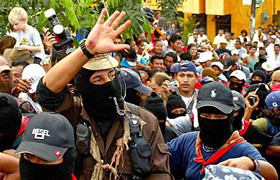 |
 |
 |
 News Around the Republic of Mexico | January 2006 News Around the Republic of Mexico | January 2006  
The Return of the Rebel
 Monica Campbell - Newsweek Monica Campbell - Newsweek


| | Out of the Jungle: Marcos, now Delegare Zero, still commands massive attention. (Bernardo de Niz/Reuters) |
Twelve years ago this month Subcomandante Marcos burst into world headlines as the head of an indigenous rebellion in the Mexican state of Chiapas. His insurrection stunned the government in Mexico City and left 150 people dead before a hastily arranged ceasefire quelled the bloodletting. Afterward, the leftist Zapatista National Liberation Army withdrew to villages deep in the jungle.

What a difference a decade makes. Last week Marcos emerged, astride a black motorcycle, to launch a national tour before Mexico's presidential election in July. Accompanied by a gaggle of reporters and TV news crews, the balaclava-clad rebel told a crowd of 15,000 cheering supporters in the city of San Cristobal de las Casas that he would highlight the social inequalities and endemic corruption that ordinary Mexicans face in their daily lives.

"Change doesn't come from above, it comes from below," declared Marcos. "We will listen to people in the places where they work, in the places where they are exploited, where they suffer racism."

Though Marcos's return to the limelight had all the trappings of a politician's campaign rally, the Zapatista leader says he isn't running for office in 2006. The ex-guerrilla, who has been identified by Mexican intelligence officials as a former university professor named Rafael Sebastian Guillen Vicente, seems more interested in shaking up the country's political establishment and, in particular, assailing the ideological credentials of the current front runner in the presidential race, former Mexico City mayor Andres Manuel Lopez Obrador.

As the candidate of the left-leaning Party of the Democratic Revolution, Lopez Obrador hopes to ride the wave of popular disenchantment with free-trade economic policies that has swept a number of leftist politicians into office across South America. But Marcos, who has recast himself as a civilian leader named Delegate Zero, dismisses Lopez Obrador as just another mainstream politician who will neglect the poor if he is elected.

Marcos plans to take what he calls "The Other Campaign" to all of Mexico's 31 states and Mexico City over the next six months. He will attack the mixed results of Mexico's adherence to the North American Free Trade Agreement and tout the improved standards of living in the two dozen indigenous villages in Chiapas under the Zapatistas' control. But it's unclear what kind of reception awaits him outside his stronghold in the Lacandon jungle. Critics say the communities, which boast doctors, libraries and schools that offer instruction in Mayan languages, are utopian experiments that are wholly dependent on donations from abroad for their survival.

Some experts question whether the pipe-smoking Marcos can build a broad base of support after the novelty of his public re-emergence has worn off. "That moment 12 years back, when the Zapatistas came down from the mountains with the thrill of purifying the country, is gone," says John Womack, a Harvard historian who has written books about the Zapatistas and the legendary Mexican revolutionary Emiliano Zapata, who inspired their name. "Now they can't claim any real weight like Hugo Chavez, or Evo Morales in Bolivia."

Perhaps. But with his flair for theatrics and blunt discussion of the prejudice afflicting Mexico's indigenous minority, Marcos will enrich the debate surrounding this year's elections. A spokesman for President Vicente Fox, who cannot seek a second term under the Mexican Constitution, welcomed the Zapatista's peaceful tour of the country. Others applaud Marcos's plunge into the political arena. "He speaks straight about the fact that 10 million indigenous Mexicans barely exist in the public eye," notes Rossana Fuentes-Berain, the managing editor of the quarterly journal Foreign Affairs en Espanol. Mexico — and the world — will be watching. | 
 | |
 |



